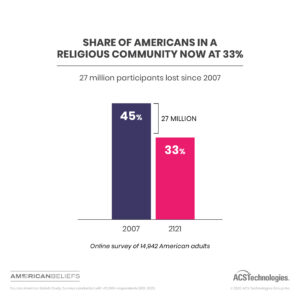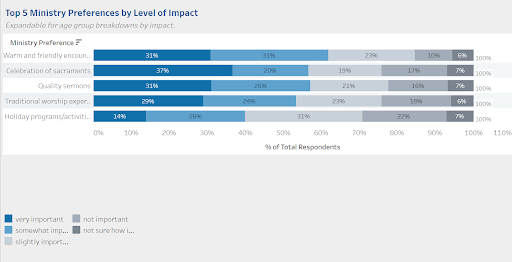The US Surgeon General recently published a health advisory titled “Our Epidemic of Loneliness and Isolation.” In his opening letter, Murthy references his many conversations with people across the country who say “if I disappear tomorrow, no one will notice.” He goes on to say: “Loneliness is far more than just a bad feeling—it harms both individual and societal health. It is associated with a greater risk of cardiovascular disease, dementia, stroke, depression, anxiety, and premature death”.
This astounding and troubling statement is reinforced by Springtide Research Institute. Their data indicate that one in three of our young people feel alone most of the time, and 40% have no one to talk to and feel left out.
While there are many factors influencing this “epidemic”, one that stands out is the trend toward autonomy and independence and away from strong communities. Our Christian faith recognizes our need for interpersonal connection and community. Our Catholic parishes can fill this void through a reset to focus intentionally on welcome and hospitality.
“For by the grace given to me I tell everyone among you not to think of himself more highly than one ought to think, but to think soberly, each according to the measure of faith that God has apportioned.
For as in one body we have many parts, and all the parts do not have the same function,
so we, though many, are one body in Christ* and individually parts of one another.”
Romans 12:3-5
American Beliefs Study
ACST conducted the most recent American Beliefs Study to help churches shape relevant ministries and to provide ongoing data and trends on people’s attitudes, beliefs and concerns in post-Covid America. There has been a significant decline in church community participation, decreasing from 45% to 33% over the past 14 years.

Parish Communities
In order to meet people where they are, we need to know what they think and need. Respondents to the American Beliefs Study were asked what they are looking for in a church. The top response from Catholics is “warm and friendly encounters” followed by “celebration of sacraments” and “quality sermons”. It is tempting to write-off the top response as too general and not useful, yet it is notable that the relational need is expressed more frequently than the focus on sacraments and homilies. We are increasingly lonely; at the same time we are saying the first thing we look for is a welcoming community.

In 2021, Dr. Janet Diaz, dean of the Institute for Ministry at Sacred Heart Major Seminary, wrote an article entitled “A Sense of Belonging: The First Step to an Evangelizing Parish”. In the article, she reflects the importance of belonging as an initial step for our parishes: “Many leaders talk about the human dynamic we call “belonging.” Psychologists say that all human beings have a fundamental need to feel they “belong,” to feel connected to others in a meaningful community. Today, belonging is often the first step in a person’s willingness to be open to Jesus Christ and his Church.”
In his research for Gallup, Al Winseman identified aspects of thriving churches with deeply engaged members. One key outcome is a strong sense of belonging to the community and personal alignment with the mission of the community. Dr. Diaz continues: “And as we grow in understanding this opportunity, we can truly appreciate that Jesus didn’t say, “Go and make disciples of all nations, but don’t worry so much about those whose beliefs or worldviews are radically different from yours.” We embrace, more and more, the call to evangelize those outside our walls.” It’s up to all of us to enable this change.
Antidote Actions
- Start with parishioners. Put yourself in the position of a disassociated person visiting to see if they want to come back. Would you be greeted? Would parishioners be happy to see you and encourage you to come back? Have parishioners welcome people they don’t know. Encourage them to start a conversation that might lead to contact information and possible follow-up.
- Create a culture of invitation. Would a parishioner invite you to an activity or an event at the parish? Would they be so excited about what is happening in the parish community that they want to invite others to join? Implement welcome and hospitality with an intentional plan to connect with parishioners who you have not seen, plus to get to know new people with a plan to follow up with them. Make it the responsibility of every parishioner in addition to developing volunteer leaders who can oversee teams of people who welcome at every Mass and event.
- Focus Outward. Bring people in from outside the walls of the parish, and ensure they have a sense of belonging. Dr. Diaz points to several books that outline an outwardly-focused parish model: “By reading books such as Rebuilt, Made for Mission, and Divine Renovation, we get a clear understanding of a new parish model which focuses on mission. The primacy of evangelization is always the driving force behind this model.”
Catholic parish communities can be the antidote to our epidemic of loneliness in the United States. For many of us it requires a significant shift in process and perspective from an expectation that people come to us, to a requirement that we go out and invite people to be part of our community. The change also means that we engage personally rather than rely on processes led by parish leaders to be the engagement engine for the parish. Young people in particular want to be confident that they are seen and known. We are all part of the body of Christ, stronger together!
See more information about the American Beliefs Study here. Listen to the podcast from Kresta in the Afternoon to hear a conversation about parish community. (Start at min 5:10.)
Terry is a multi-disciplined executive passionate about serving the Church by supporting his leaders and organizations. His experience includes coaching and training Catholic leaders, facilitating priority planning with dioceses and parishes. And consulting with parish leaders to engage parishioners. And using technology to foster stewardship. Terry serves as chairman of the finance council for his home parish in Hartsville, SC. And as cantor for his parish in Myrtle Beach.




